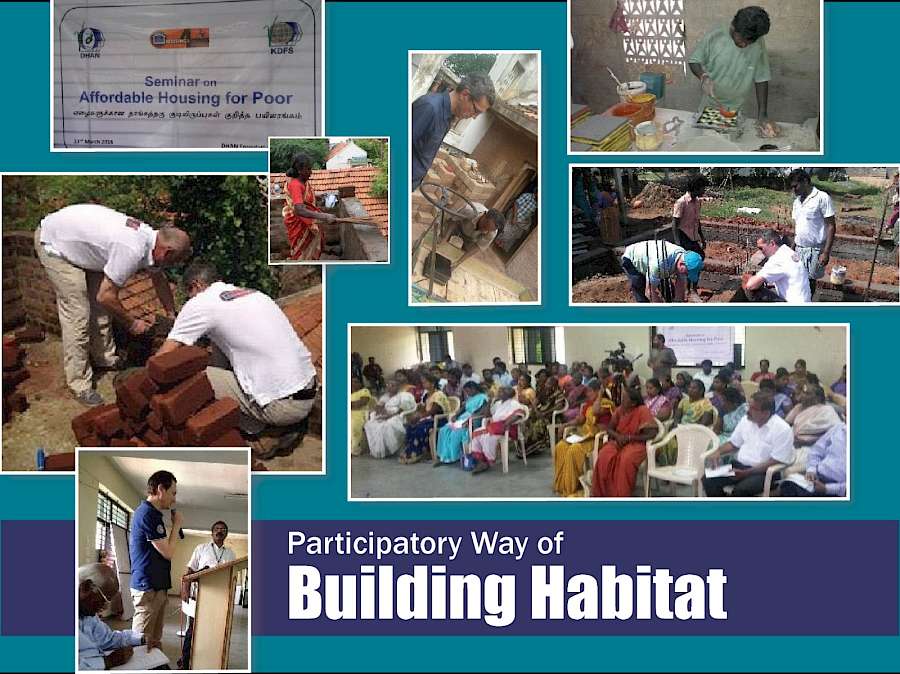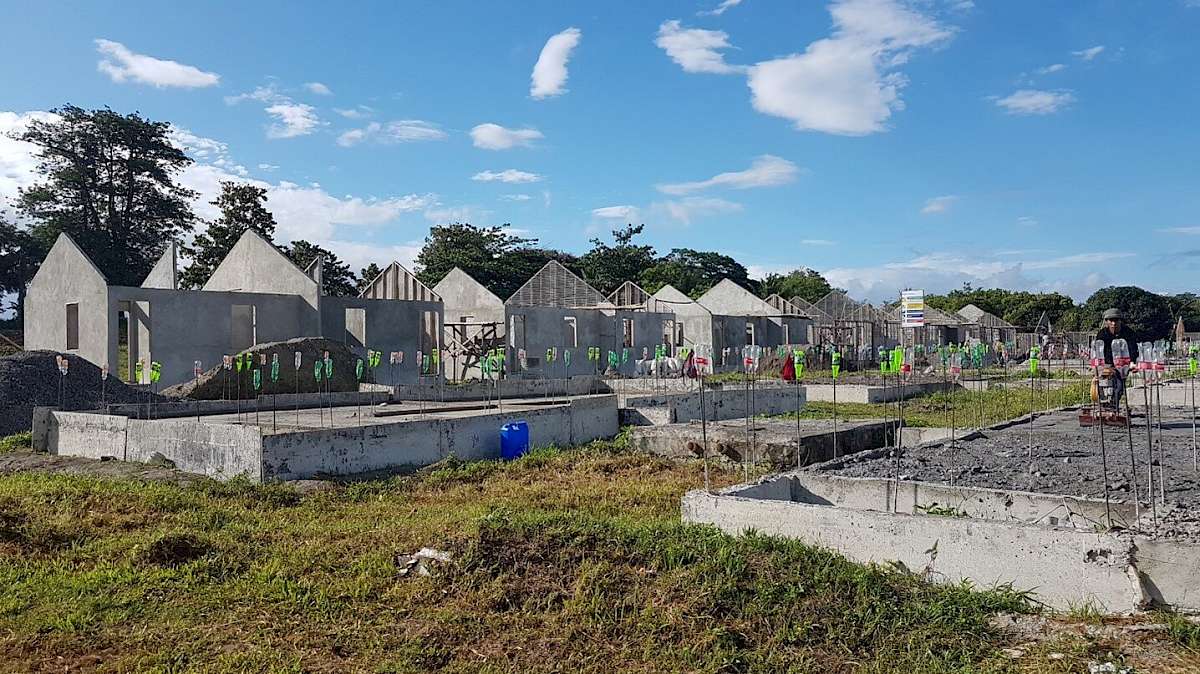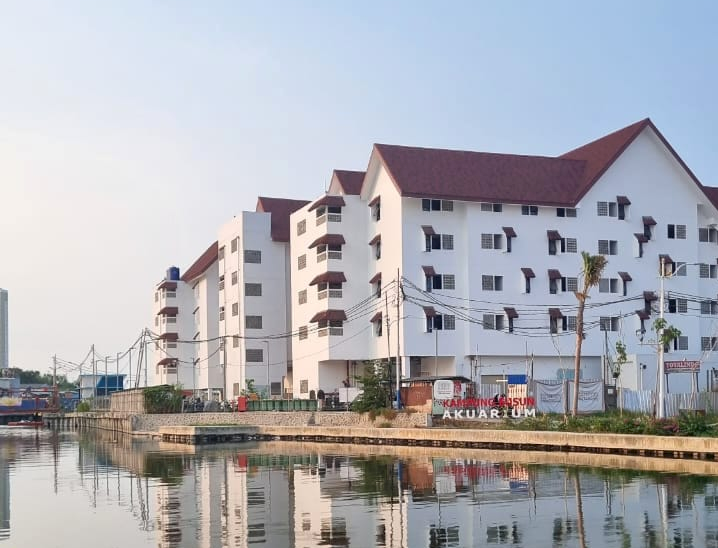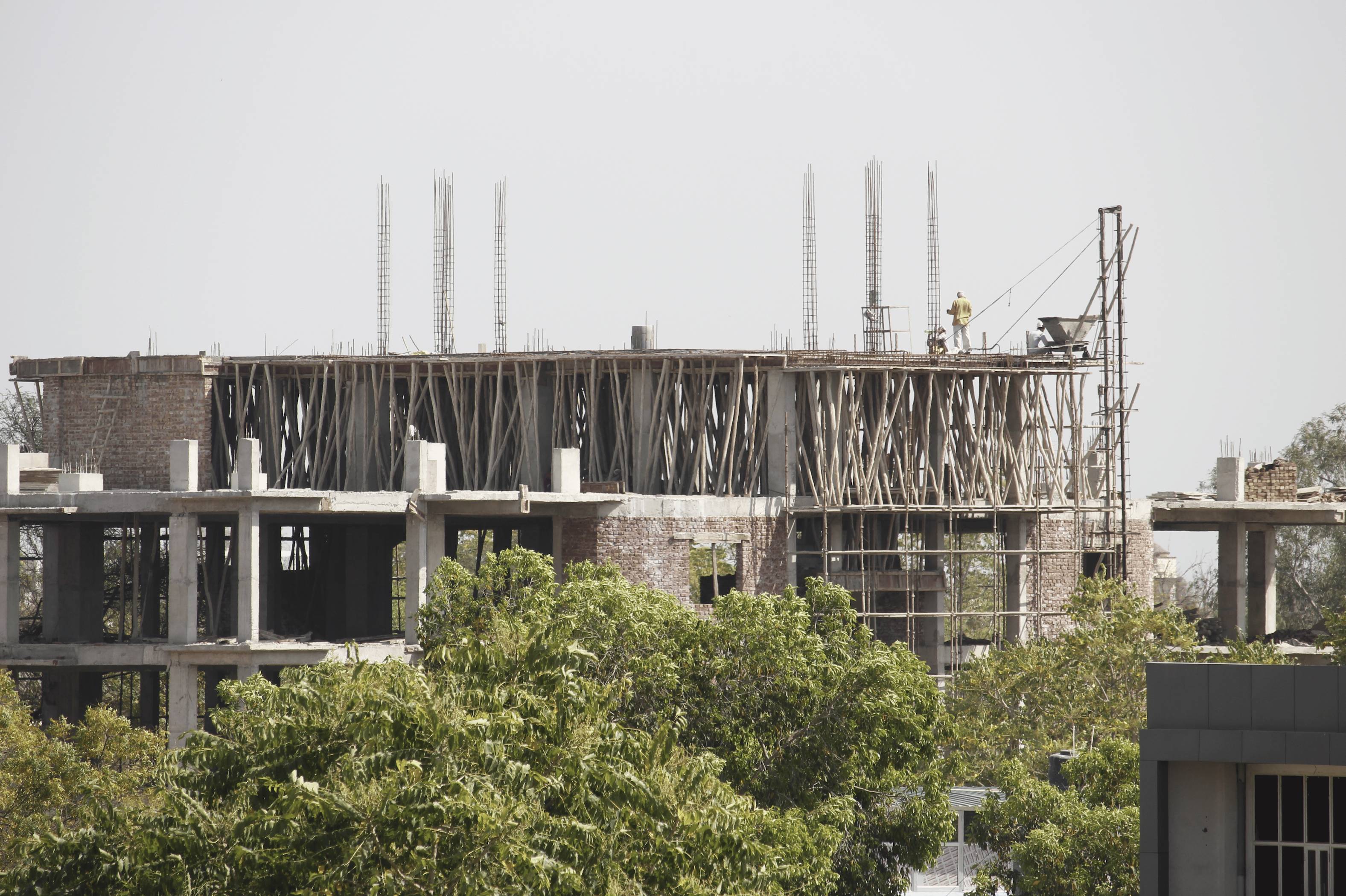
Housing significantly impacts the environment, consuming vast resources during construction, operation, and maintenance, and generating substantial waste during renovation or demolition. Furthermore, homes and buildings are major contributors to global energy use and carbon emissions, placing the sector at the forefront of climate change mitigation. This was recently acknowledged at the COP 28 climate conference, where the Alliance for Building and Construction (ABC) launched a "buildings breakthrough" initiative. This initiative aims to make "near-zero" and resilient buildings the norm by 2030, thereby accelerating the transition to sustainable buildings worldwide.
In addition to climate considerations, sustainable housing practices are vital for reducing resource use, environmental impacts, and achieving global sustainability targets, including SDG 12. Housing also plays a crucial role in social wellbeing, being both a human right and central to human dignity.
The quality, location, and affordability of housing are closely linked to social outcomes like health, education, and income. Environmentally sustainable housing should thus promote equitable access to decent and safe housing, contributing to social objectives. Sustainable design, materials, and construction processes also support social development, particularly in health and safety, quality of life, and affordability.
Within the context of the Asia-Pacific Housing Forum organised by Habitat for Humanity on 26-27 October 2023 in Suwon, Republic of Korea, a Special Award for Sustainable Consumption and Production (SCP), supported by EU SWITCH-Asia, recently recognized initiatives that incorporate sustainability in housing solutions.
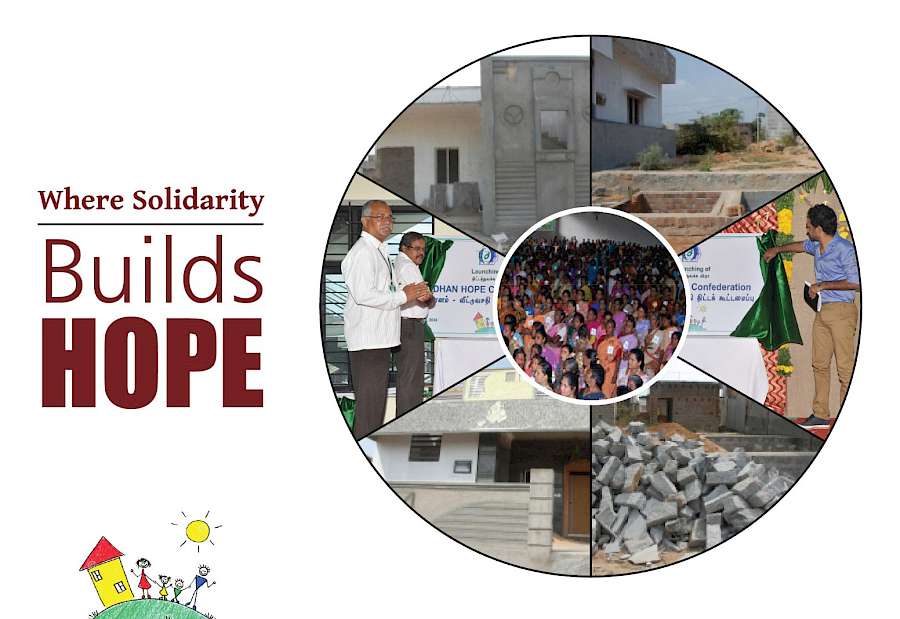 One of the winners is the Indian NGO DHAN Hope, part of the DHAN Foundation, which addresses housing as a cornerstone of social development and integrates social and environmental aspects into planning and construction. This initiative combines various activities, including finance access, housing affordability, sustainable materials, resource efficiency, and health improvements through sanitation and drinking water access, benefiting over 1.7 million people.
One of the winners is the Indian NGO DHAN Hope, part of the DHAN Foundation, which addresses housing as a cornerstone of social development and integrates social and environmental aspects into planning and construction. This initiative combines various activities, including finance access, housing affordability, sustainable materials, resource efficiency, and health improvements through sanitation and drinking water access, benefiting over 1.7 million people.
It has highlighted the following aspects as unique to the DHAN Hope approach:
- Effective Technology: Utilizing local technologies that minimize costs without compromising quality. For example, most houses use “stub footing”, effectively a stable, durable and low-cost foundation for houses that is adapted to local soil and allows for a speedy construction process. The stubs can be sourced from locally available materials, thereby reducing costs.
- Incremental Housing: The typical house built by DHAN Hope has 25 square meters of space, including a dedicated area for hygienic cooking. The house is built in a way that allows for a gradual expansion to meet evolving family needs, while starting out with low-cost options.
- Health and Sanitation: Ensuring the health of occupants by prioritising their wellbeing with ample airflow, shading and basic insulation of houses, as well as providing sanitation facilities and quality drinking water, including access to piped water and installation of roof water harvesting systems.
An integral part and starting point of DHAN Hope’s work is stakeholder integration and community engagement. Engaging with all stakeholders to create housing solutions that are community-focused and sustainable, it strengthens social ties among the community. In addition, the NGO supports the overall community, through training and the use of local workers, thereby enabling economic opportunities. DHAN Hope seeks to create positive feedback loops around housing and sustainability.
DHAN Hope also emphasizes stakeholder integration, community engagement, and local economic opportunities, creating positive feedback loops around housing and sustainability.
Valuing Sustainable Consumption and Production Practices
Three SCP Award jurors, Dr. Zinaida Fadeeva, Florian Beranek, and Cosima Stahr, highlight characteristics of this initiative and two “honourable mentions” from the Philippines and Indonesia. These aspects complement target group needs identification, partnership development, innovation, skills development, and maintenance.
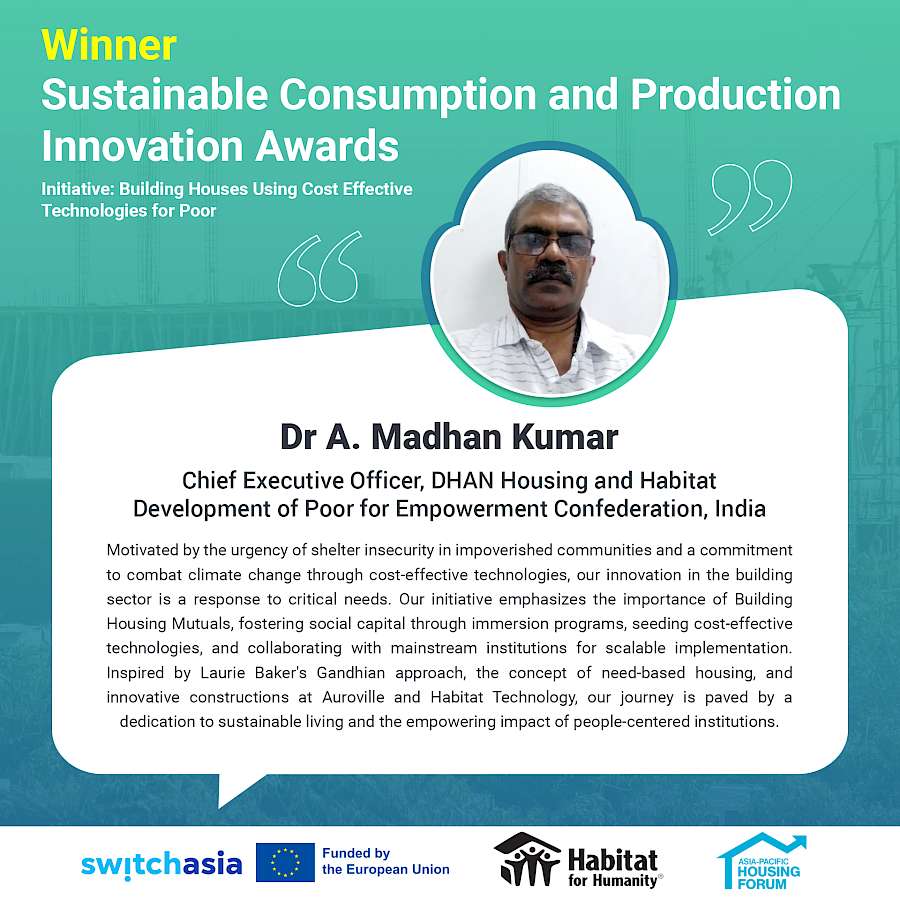
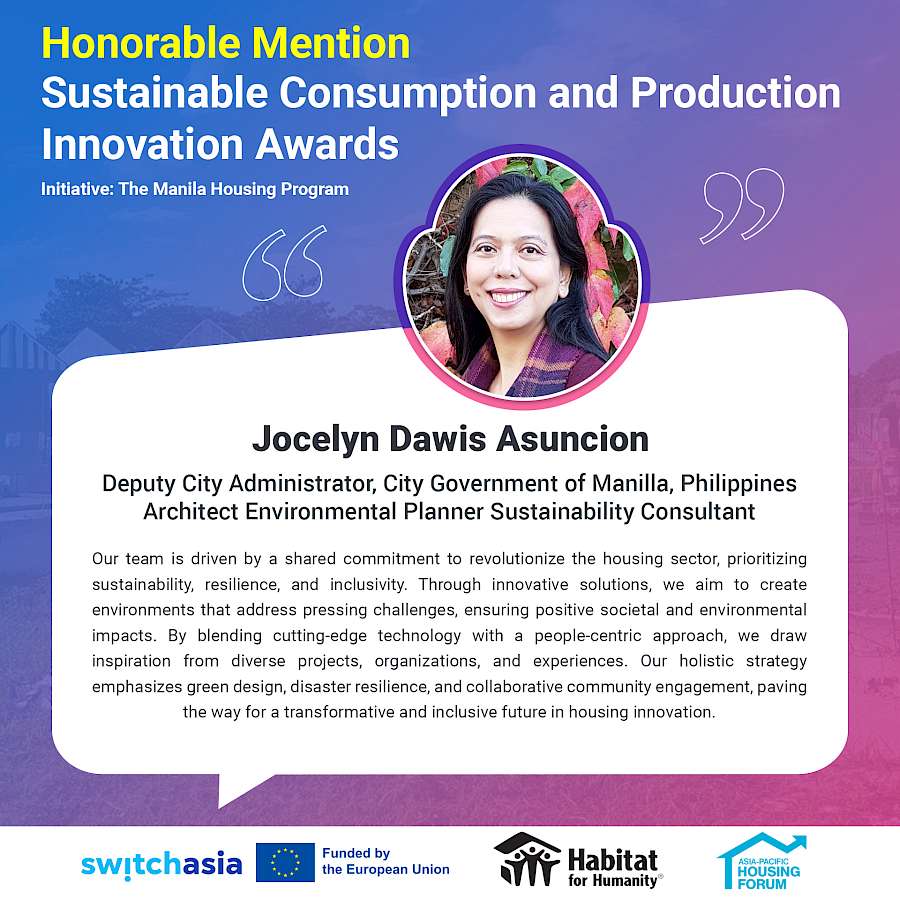
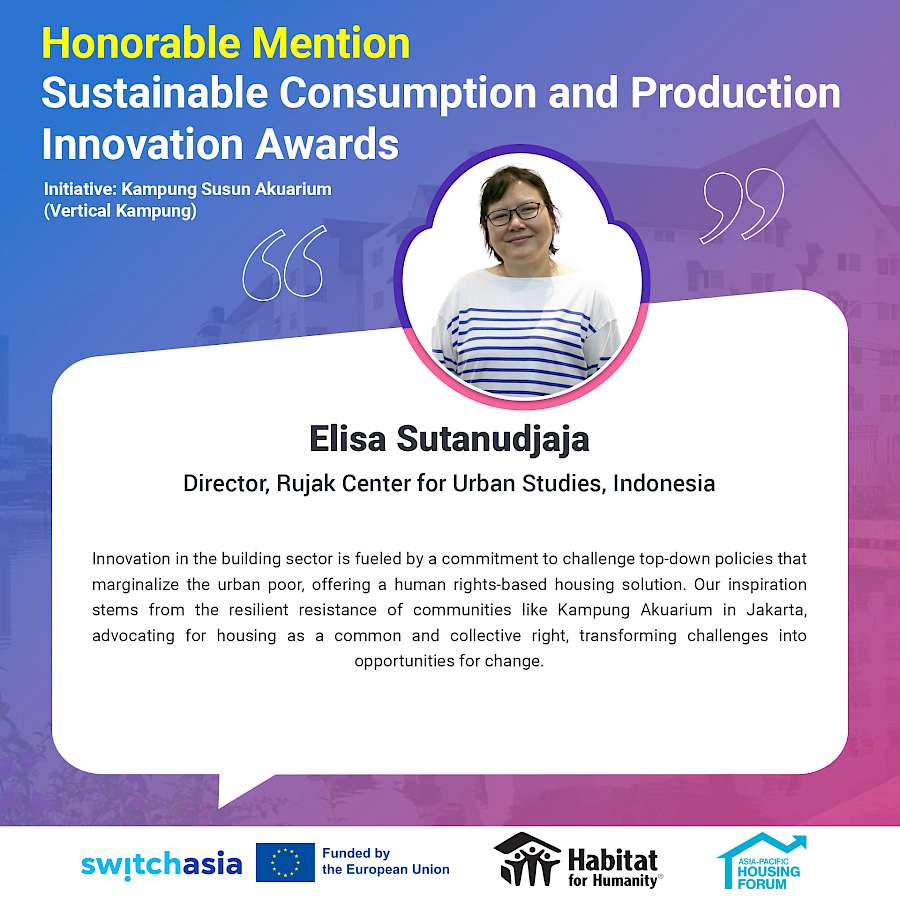
SCP integration into design and planning: SCP principles aim to minimize the negative environmental impacts throughout the lifecycle of buildings while not compromising on quality of life and wellbeing. Architectural design lays the foundation to address housing challenges, and it needs to be interwoven with spatial planning and urban planning that prioritises sustainability. Equally, housing initiatives must consider inclusivity and meet diverse needs. Inclusive design ensures that everyone, regardless of age, ability, or economic status, can find a home that suits them.
Enabling affordability and accessibility: These aspects are essential in Asia to accommodate the rapidly urbanizing population, ensure social stability, enable sustainable lifestyles provide resilience against environmental challenges. Housing affordability is paramount in Asia because it directly impacts poverty levels, with excessive housing costs pushing families into financial hardship. The rise of informal settlements in many Asian cities is a testament to the acute need for housing that is both affordable and accessible to the urban poor. Housing accessibility is not just about affordability but also about the proximity to essential services like healthcare, education, and public transportation, as well as work and community support.
This focus is shared also by the SCP Award “honourable mention” The Manila Housing Program. The initiative ensures housing for various income groups, especially prioritizing low-income families and informal settlers. By offering in-city housing options, it allows residents to maintain essential connections to urban resources, workplaces, and social networks, fostering stronger community ties and minimizing isolation. The mixed-income occupancy approach reduces stigmatization and supports community integration.
It incorporates environmental considerations, innovative green elements, and disaster resilience into its housing projects. With the emphasis on designing buildings for longevity using circularity principles, the program reduces resource consumption, waste, and carbon emissions. The inclusion of durable materials, modular designs, and the reuse or upcycling of construction materials further enhances its sustainable footprint.
Policy engagement is essential, as national, state and local governments wield significant power in shaping the housing market. They should prioritise the human right to housing over the interests of market actors, such as developers, financiers, and the construction industry. A rights-centred perspective allows to recognize and enhance what already exists, such as upgrading informal settlements, thereby ensuring that housing policies are serving the population. Reflecting this priority, DHAN Hope is also working with state governments to help them understand and fill their pivotal roles as policymaker, shaping the frameworks for market actors, as well as investor and facilitator for housing.
This understanding is also part of the second “honourable mention” initiative of the SCP Award, the Kampung Susun Akuarium in Jakarta. This initiative is built on the belief that housing solutions should be based on human rights, with housing viewed as a social good and a form of resilience. As a process and production of settlements in the form of vertical housings, consisting of residential units that are equipped with facilities and infrastructure as in “kampungs” (informal settlements) in general and support the unique ecosystem of economic, social and cultural activities of kampung inhabitants; where planning and development are carried out equally, and collaboratively with multi-stakeholders, control, and management by legal entities formed by the community.
Affordable and sustainable housing is a stabilizing force in society, providing a foundation for individuals to lead their lives independently and pursue education and employment opportunities.
The SCP Award Winner DHAN Hope and the two initiatives that were deemed “honourable mentions” are exemplary in recognising the essential nature of housing and buildings, and integrating SCP considerations, and they can serve as inspirations for other initiatives in this important sector.
Connect with the winners of the Innovation Awards (download the Digital Booklet)
